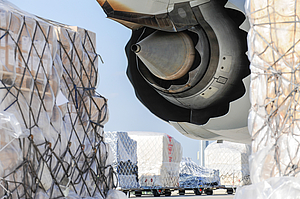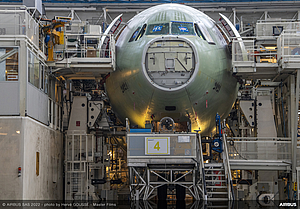Freighter Boom in the Airfreight Industry
As a result of the COVID-19 outbreak in 2020 and the far-reaching flight restrictions for passenger aircraft, airlines had to shift their strategies. At the beginning of the crisis, the aim was to transport medical supplies, face masks and other protective materials across entire continents as quickly as possible. In the months that followed, airfreight was used as an alternative when sea shipping routes or ports were congested.
At present, the airline industry is witnessing a considerable trend towards more freighter solutions to cope with the growing demand for air cargo capacity. In its latest Commercial Market Outlook for the next 20 years, Boeing confirms this trend and forecasts a faster growth of the cargo business compared to the passenger business. Many supply chains continue to be disrupted due to the pandemic, therefore more components for key industries are currently being shipped by air. With missing capacities from Russian airlines and additionally re-routed or cancelled flights, the Russian invasion of Ukraine has significantly reduced global airfreight capacity as well. Finally, the recent growth in e-commerce is pushing capacity demand even further.
Full order books for manufacturers
As a result, freighter aircraft are back in vogue. Converted passenger-to-freighter aircraft or “preighters” are the big driver of the capacity boom. Around two thirds of the new freighters entering the market will be the former – refitted – passenger aircraft.
In addition, wide-body models by Airbus and Boeing have reported a large increase in order volumes. Airlines which transported freight mainly as additional cargo before COVID-19 are now increasingly ordering freighters as a result of their changed fleet strategies. Lufthansa Cargo nearly doubled the capacity of their wide-body freighter fleet by ordering ten wide-body freighters as part of the largest investment in the company’s history. Air France-KLM also plans to operate eight A350 wide-body freighters.
The strong growth in airfreight capacity is further accelerated by carriers such as Maersk and CMA CGM, who have ordered massive numbers of freighters and will have large fleets within the upcoming years. Even smaller airlines rely on the purchase of new freighters, such as Saudia with an order of seven Boeing 777-300 preighters or Air Zimbabwe with an order of two Boeing 777F.
Rush leading to a bubble?
But there is also pessimism within the industry. Looking further ahead, airlines such as Cargolux do not want to make hasty decisions. According to Cargolux CEO Richard Forson, the purchase of an aircraft should be considered as an asset for the next 20 to 25 years and evaluated with a long-term view. The unprecedented amount of freighter orders and the immense new capacities entering the market are raising the question of how sustainable the current demand boom will be. Could the bubble burst as higher inflation and the possibility of global recession start to impact demand? The past two years, which have been extremely lucrative for airfreight companies, seem to have tempted some market players to build up more capacity. Once markets and demands return to normal, this could lead to an oversupply which could affect not only individual companies but also the whole industry.

Charter Solutions between China and Europe
cargo-partner offers regular cargo charter flights between several destinations in China and Europe. Start planning early and benefit from our reliable charter services to maintain your supply chain!

